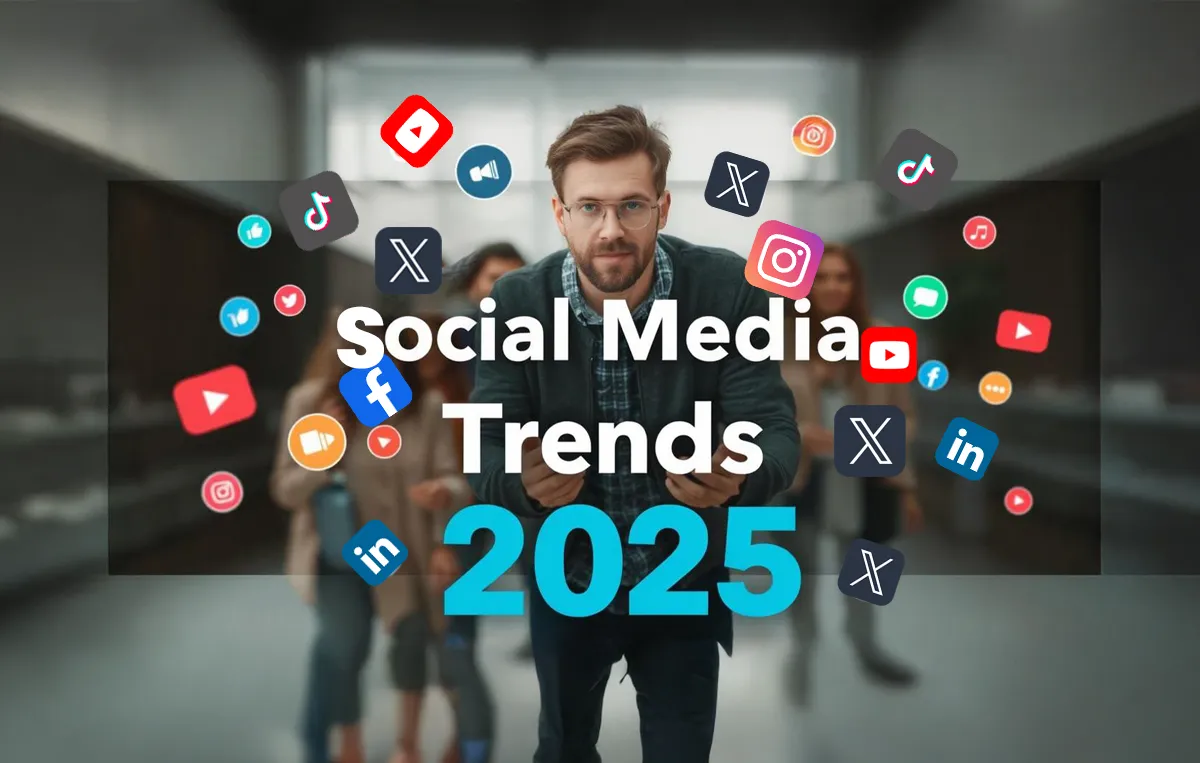It’s 2025, and social media is changing. Ironically, it’s the most exciting and challenging part of being in the social media industry.
With constant pressure to stay ahead of trends, especially after the surprises 2024 threw our way, staying on top of what’s next is essential.
Also, if you use social media to grow a brand, earn an income, or connect with an audience, just knowing the trends on social media isn’t enough; you need to know how to make them work for you.
That’s why we turned to the real experts in our recent webinar on social media trends. Social media industry experts Jon Stephen Stansel, Katie Murphy, and Luan Wise shared their invaluable insights on what’s shaping the future of social media. Their discussions provided a roadmap for success in 2025.

To help you make sense of it, we have evaluated their insights, analyzed data, and developed the 14 social media trends that every marketer, social media manager, creator, and business owner must watch closely in 2025.
1. Creativity Triggered by AI
AI isn’t just a buzzword; it is making a difference in social media, especially now that it has comfortably fitted itself as a social media bestie. This social media trend is all about Artificial Intelligence being everywhere. It plays an active role in the social media user journey and content discovery on social media.
During the SocialPilot Webinar, panelists explored the role of AI in social media marketing, sharing insights on how to leverage it effectively while maintaining authenticity. Katie Murphy, Head of Social Media, shared a similar concern, particularly about the overuse of AI on social media, where it’s painfully apparent when comments are AI-generated.
She didn’t hold back, calling out those generic AI responses that add no value, “Those generic AI comments on LinkedIn like, ‘I agree,’ are the worst. They don’t add value,” she said.
Jon, a seasoned expert, emphasized the importance of using AI as a tool—not as a replacement.
“AI is a tool, not a replacement.”
– Jon Stephen Stansel
A very interesting question came up, “How do you use AI effectively without losing authenticity?”
Katie said,
“Use AI for brainstorming ideas or drafting content, but always review and edit to ensure it matches your brand’s voice.”
– Katie Murphy
And we agree. This is the golden rule for using AI in content creation. It is tempting to rely entirely on tools like ChatGPT and Gemini, but they’re not perfect. Whatever they generate, the final polish must come from a human hand.
You know your audience, your brand voice, and your goal better than any machine ever could.
Listen to the full discussion on this trend in the webinar
Why It’s Important:
AI in social media is emerging at an alarming rate, and you, too, must know all AI is capable of. Recent prediction about AI in social media gives a string of reasons why you need to get familiar with AI for your day-to-day life:
- By 2025, AI-powered tools are expected to drive 90% of the content creation workflow.
- Over 38% of social media marketers use generative AI to make posts.
Actionable Tip:
AI offers immense potential for social media marketers, but its use should be strategic and intentional. We encourage marketers to use AI as an enabler, not a replacement:
- Try AI-powered Social Media Tools: Employ an AI-powered social media management tool. This tool can automate repetitive tasks like scheduling and reporting, freeing up your time to focus on more strategic decision-making and audience insights.
- Use AI to Brainstorm Ideas: Use AI tools to brainstorm ideas. These AI tools can help you generate fresh content angles, hooks, and campaign ideas quickly. They are especially useful when you’re facing creative fatigue or need to scale ideation across multiple platforms.
- Write Smarter, not Harder: You can draft post captions using generative AI. This will help you to speed up the writing process while maintaining consistency in brand voice. With the right prompts, AI can help you test multiple tone variations and boost engagement through smarter copy.
- Design Faster with AI Tools Like Canva: Create visuals using tools like Canva AI, keeping the touch of human authenticity intact. AI-powered design tools can rapidly produce social-ready visuals tailored to your brand. Use them to accelerate design cycles—while still adding the final human touch to ensure authenticity.
Note: AI can optimize workflow, but shouldn’t replace genuine human insights; balance automation with creativity.
2. Micro-Niche Community Building Through Comments
In 2025, we will shift away from broadcasting and large impersonal audiences towards niche-micro community connections with more minor, highly engaged groups.
Community building has become the cornerstone of modern social media strategies, whether through private groups, direct messages, or even the comments section.
Niche communities ensure specialized engagement, enabling brands to build deeper and more meaningful connections. These groups thrive on shared interests, creating a sense of belonging and loyalty, which is missing in the macro community.
Why It’s Important:
Micro-communities drive up to 60% more engagement than broader, generalized audiences. Platforms like Threads, BlueSky, Reddit, and private community groups will be the hotspots for these niche interactions.
Instagram has been releasing features encouraging private sharing, such as Notes, to enhance the DM experience.
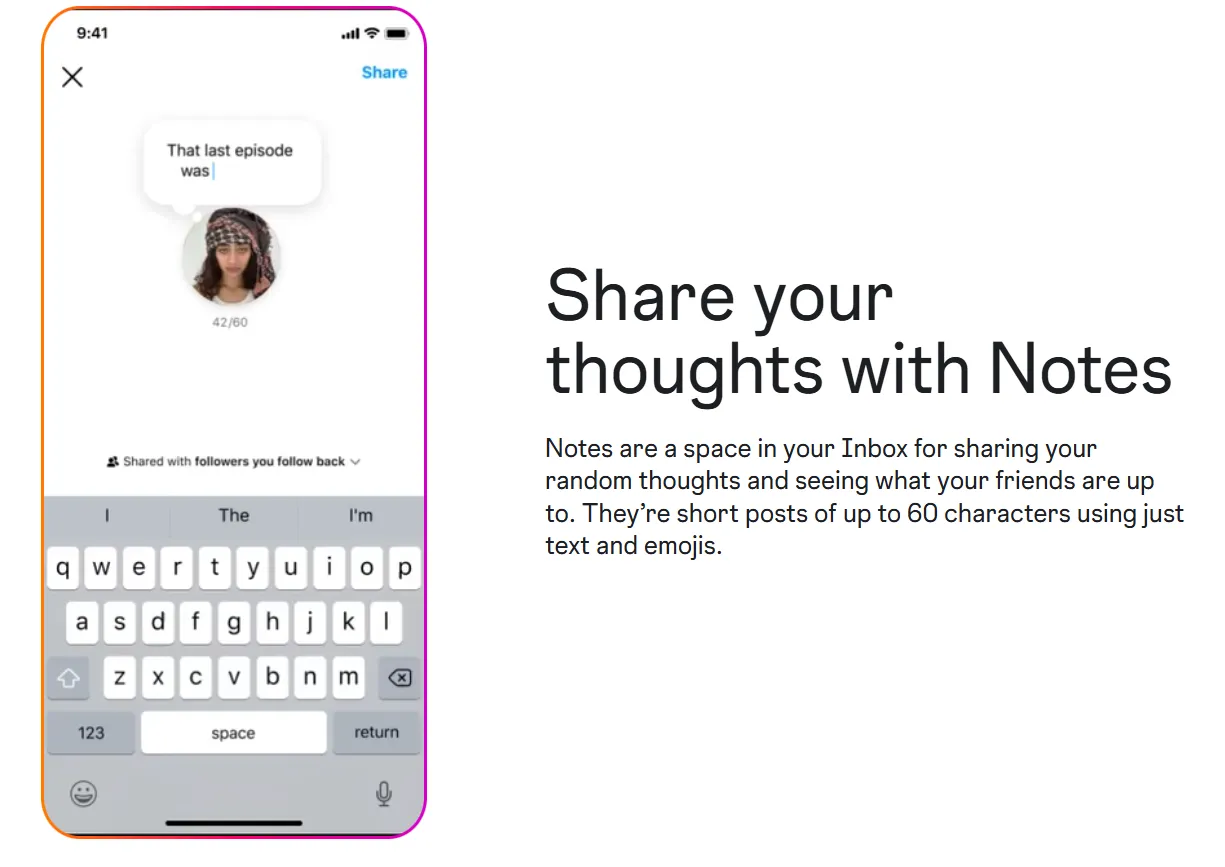
YouTube will soon be upgrading its community tab where creators and brands can share their old posts or polls, and a space where their audience can share their content.

While niche communities are essential, one of the most underutilized areas for community building lies right under our noses: the comments section.
In the Social Media Trends Webinar, Jon emphasized this point with a simple yet powerful observation:
“There is gold in the comment sections that people are just ignoring. Brands need to trust their social media managers to engage authentically.”
– Jon Stephen Stansel
After being in the social media industry for over a decade, we at SocialPilot have understood that social media comments are more than just reactions; they’re opportunities for genuine conversations. They allow brands to directly interact with their audience, answer questions, and build a loyal following.
Laun highlights that this approach isn’t just about responding to comments; it’s about creating a dialogue that fosters trust and engagement, the interaction that follows.
While we agree with the importance of comments, we can not forget that engaging with comments requires time and effort. Still, the payoff regarding community loyalty and brand credibility is invaluable.
Additionally, our social media manager also highlighted how she used the comment section as the gold mine of content ideas. More than just engaging, we can find relevant ideas our engaging audience is most interested in.
So in summary, we can say that engaging with social media comments isn’t just about replying. It’s about building real relationships. It shows your audience you’re listening, creates a sense of belonging, and helps you discover what they truly care about. Over time, this back-and-forth turns casual followers into loyal community members and gives you valuable content ideas along the way.
Listen to the full discussion on this trend in the webinar
Actionable Tips from Experts:
- Start small and build where your audience already talks: Start by looking at where your followers are most active (comments, DMs, niche groups) and make those spaces your starting point for regular conversations.
- Spot and serve your micro-niches: Pay attention to recurring interests or pain points like struggling to keep up with constant content demands, confusion over platform algorithm changes, low engagement despite consistency, and more in your audience segments. Accordingly, tailor your posts, replies, or even entire campaigns around those specific topics.
- Show up consistently: Respond to comments left by your followers. Use this opportunity to ask follow-up questions, and make people feel seen. That consistent presence is what builds trust and loyalty over time.
- Create feedback loops: Use popular or thought-provoking comments as inspiration for future content, polls, or discussion starters—it shows you’re listening and adds real value to the community.
3. Multi-Format Content: Are Carousels Leading the Way?
Sharing photos, videos, and carousels is gaining popularity, marking video-only content dominance. Social media platforms are adapting their algorithms to favor diverse formats, including images, carousels, and vertical videos, offering users more creative freedom.
While multi-format content is gaining traction, carousels are emerging as a high-engagement format, particularly on Instagram and TikTok. SocialPilot Instagram Trends Report 2025 revealed that carousels get 22.73% more engagement and have an 8.4% higher engagement rate than image or video posts.
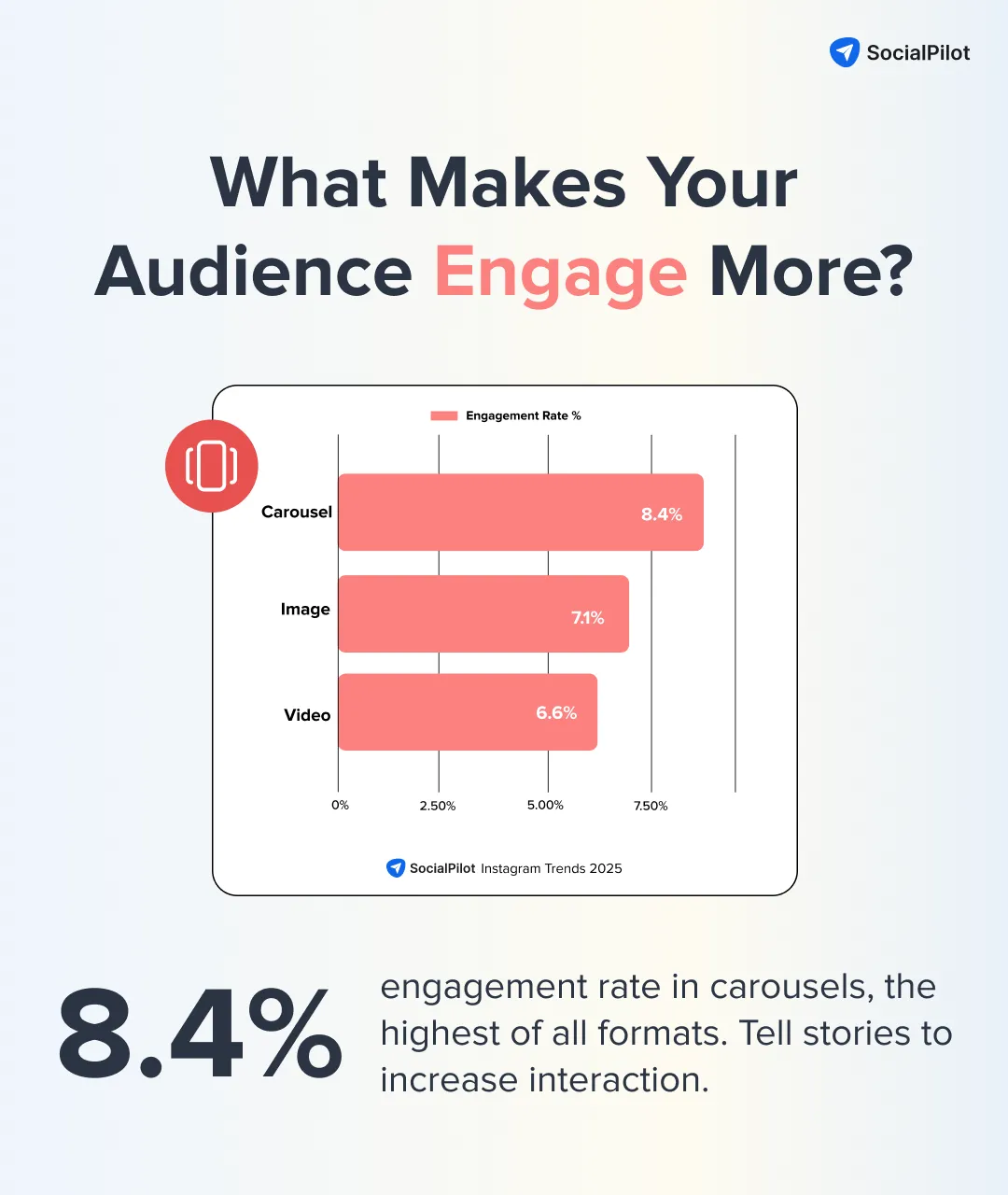
During the SocialPilot Webinar, panelist Katie Murphy highlighted how content strategy is more important than content format. She says, “It does not depend on the format but the actual content itself for how it will perform.“
Luan highlighted the effectiveness of carousels in boosting engagement.
She explained:
“Carousels give you more opportunities to show up in the feed, making them super effective for engagement.”
– Luan Wise
By appearing multiple times in a user’s feed, carousels offer brands a second (or even third) chance to capture attention and spark interest.
Adding to this, Jon explained how Instagram extended carousel posts to 20 images, and this may be the reason why Instagram is promoting it by showing it more on the feed.
We suggested focusing on visually engaging slides, using concise text, and ending with a strong call to action on the last slide. This approach ensures that each slide in a carousel is impactful and stands independently, increasing the likelihood of engagement. But it all depends upon your message and your story.
Listen to the full discussion on this trend in the webinar
Why It’s Important:
- Carousels Are Becoming Algorithm Favorites: Carousels aren’t just pretty. They give your content multiple touchpoints in a user’s feed. That means higher visibility and better engagement. If you’re trying to educate, tell stories, or share step-by-step tips, carousels are your best friend.
- TikTok and LinkedIn Are Evolving—So Should Your Format Strategy: Platforms like TikTok now support photo carousels, and LinkedIn is testing multimedia content. This shift means even traditionally video- or text-heavy platforms are rewarding variety. By adapting your content formats, you stay relevant and expand reach across audiences who consume differently.
- Multi-Format Testing Helps You Learn What Clicks: Don’t stick to one format—test what works. Some audiences love short videos, while others scroll through image posts. Testing helps you understand your audience better and align your strategy based on what truly resonates and performs.
Actionable Tip:
- Leverage Carousels: Start posting visually engaging carousels on Instagram, and cross-promote them on LinkedIn and Tiktok. This boosts your visibility across platforms and helps you maximize each content asset’s lifecycle—great for busy teams trying to do more with less.
See how Likfoon shares a unique strategy to help you repurpose content for Carousel posts.
View this post on Instagram - Repurpose Blog Posts: Turn in-depth blog content into carousel posts or Twitter threads. This keeps your best-performing ideas alive, breaks down complex info for your audience, and saves time by reusing content in formats that drive more engagement.
- Experiment with Formats: Try a mix of videos, static images, carousels, and even GIFs across platforms. It helps you understand what format your audience prefers where—and lets your team build a more informed, flexible content strategy that adapts to algorithm changes.
In various post formats, carousels can engage users across multiple slides, combined with the flexibility to repurpose them for other platforms, making them invaluable.
Want to know why Carousels generate the most engagement on Instagram?
Find Instagram’s most popular content type and more in our Instagram Trends 2025 Report.
4. Long-form Content Makes a Comeback
Following up on the popularity of text-based content in 2025, long-form content is also returning, especially when it gives value.
While short-form video content dominates attention spans, in 2025, platforms like YouTube and in-depth Instagram carousels will be perfect for balancing them with standout pieces to establish yourself as a thought leader in your niche.
Long-form content is over 5 minutes long in landscape format that you view on platforms like YouTube. Short-form content is less than 5 minutes long in vertical format, and you can view it on Snapchat, Instagram Reels, TikToks, etc.
One of our panelists for social media trends webinars, Luan Wise, highlighted the enduring power of long-form content.
“Long-form content never disappeared; it just takes more time to produce. It’s great for deeper engagement and top-of-funnel awareness.”
– Luan Wise
In our view, this perspective emphasizes the importance of investing time and effort into creating content that educates, informs, and connects with your audience on a deeper level.
Moving on in the webinar, Luan also explained how to balance short-form and long-form content with a practical twist. “Start with long-form to establish thought leadership, then repurpose it into bite-sized formats for social platforms.”
Well, that’s precisely what we do. We follow this approach because it maximizes your content’s value and ensures you cater to different audience preferences across platforms.
Listen to the full discussion on this trend in the webinar
Why It’s Important:
- Create Long-Form YouTube or TikTok Videos: Use long-form video to dive deeper into topics your audience cares about. Think explainers, thought leadership, or behind-the-scenes content. It builds credibility and boosts watch time, which platforms reward with better reach and monetization potential.
- Value of In-dept Content: Your audience craves authenticity and depth. This is a great chance to stand out with thoughtful content that speaks to their specific interests and not just chase what’s trending. It’s a smart play for brand trust and loyalty.
- Extended Limit of Long Form Video on TikTok: Last year, TikTok extended its long-form upload limits to 30 minutes after testing it for 3, 10, and 15-minute limits. TikTok’s move shows us a signal of a platform-level shift toward depth. This is your cue to experiment with educational, story-led, or behind-the-scenes content to hold attention longer and meet changing viewer expectations head-on.
- Update to Social Media Platforms: Social media platforms increasingly add features and functions to encourage creators and brands to make longer-form, high-quality content, and videos so viewers spend more time on their platforms.
Actionable Tip:
Here’s how you can tap into the resurgence of long-form content in 2025:
-
- Invest in high-quality, long-form content to build authority: Deep-dive content positions your brand as an expert. Whether it’s a guide or explainer, showing your knowledge builds credibility, trust, and keeps your audience coming back for value—not just quick tips.
- Publish how-to content or case studies: How-to’s and case studies are perfect for showcasing your experience. They will help you to demonstrate results, educate your audience, and help potential clients see how you can solve their exact problems in real-life scenarios.
- Create longer YouTube videos along with long TikToks: In our opinion, longer content lets you tell stories in full. This is great for building brand affinity. You can walk through strategies, give in-depth demos, and deliver more value while riding the algorithm’s preference for longer engagement.
Start YouTube Podcasts and do more live streams on TikTok, Instagram, and other platforms: Live sessions and podcasts give your brand a voice—literally. They’re great for building relationships, showing up consistently, and offering real-time insights that reflect thought leadership and build trust with niche audiences.
If you’re focusing on Instagram, keeping up with what’s trending on Reels can make or break your reach. Check out the latest Instagram Reels trends to create content that’s fresh, relevant, and algorithm-friendly.
And if TikTok is your focus, its algorithm thrives on trend-driven content. Staying ahead of the curve means knowing what’s hot right now—our TikTok trends guide has you covered.
As social media platforms continue to evolve, the boundaries between them are becoming increasingly blurred.
In 2025, platforms like Instagram, TikTok, YouTube, and LinkedIn are moving toward adopting similar features, resulting in a more unified social media experience.
During the SocialPilot Social Media Trends 2025 Webinar, a participant asked, “How do I make strategies for each social media if they are slowly becoming similar?”
Luan said,
“Instead of creating a strategy for each social media platform, focus on creating a strategy for your brand and then decide on the platform.”
– Luan Wise
Another question was, “What are the top three content differences one should follow on Facebook and Instagram, or are they the same?”
Jon highlighted how he used to create a separate strategy for Facebook and Instagram years ago. Still, today, as all the social platforms work similarly, he uses the same approach to all.
He followed up on what Luan said, adding, “You should create a strategy for your brand and audience more than the platform.”
Listen to the full discussion on this trend in the webinar
Actionable Tips for Brands
The blurring of lines between platforms makes it essential for brands to:
- Diversify Their Presence: Being on multiple platforms increases your brand’s discoverability and resilience. If one channel’s algorithm changes, your visibility won’t collapse. It’s a smart way to reduce risk and reach different audience segments where they naturally engage.
- Stay Adaptable: Social platforms are evolving fast. Staying up to date helps you respond to changes in content formats, features, or audience behavior. This helps in keeping your brand relevant and competitive instead of falling behind when trends shift.
- Leverage Analytics: Data shows you where your audience actually engages. Use it to double down on high-performing platforms and content types, so you don’t waste resources guessing what works. It’s how strategic brands make confident, ROI-focused decisions.
6. LinkedIn’s Evolution and Rise in Founder-Led Thought Leadership
LinkedIn has transformed dramatically in recent years from a platform for job seekers and recruiters to a hub for thought leadership, meaningful conversations, and personal branding.
This shift isn’t just about LinkedIn but the broader move toward authenticity and founder-led content across social media. Brands and leaders leverage these changes to connect with audiences more personally, yielding impressive results.
During the SocialPilot Webinar, panelist Luan Wise highlighted LinkedIn’s increased focus on integrating personal profiles with company pages. This evolution allows employees, founders, and executives to collaborate seamlessly in building a brand’s voice.
“LinkedIn has much more integrated use of personal profile supported by a company’s page. So being able to put some money behind EGC, partner’s content, and event speakers collaboration to push the content can bring huge reach and engagement.”
– Luan Wise
She emphasized the value of using these tools to extend a brand’s reach and establish authority in the industry.
Luan also highlighted how brands have changed this idea of sharing authenticity from organic promotion to ads, eventually killing the entire intent.
We have noticed LinkedIn’s broader shift towards authenticity. It’s no longer just a platform to post your resume; instead, it’s become a space where creative and genuine conversations thrive.
Listen to the full discussion on this trend in the webinar
Take SocialPilot Co-Founder Jimit Bagadiya, for example; he has built a reputation as a social media expert, sharing insights and expertise on LinkedIn. This positions him as a trusted authority and aligns SocialPilot as the preferred tool for scaling social media strategies.
Why It’s Important:
- Founder-led content drives 35% more engagement: People scroll past polished brand posts, but they pause for a founder sharing a raw insight, a behind-the-scenes story, or a hard-earned lesson. It feels real and helps to build trust—especially if you’re a growing brand looking to stand out.
- Thought leadership isn’t just a buzzword—it’s your brand’s loudest mic: If as a founder you share your experiences, you don’t just build your own credibility. In fact, they pull attention toward your business. It’s strategic storytelling that sparks conversations, builds authority, and keeps your brand in the spotlight without even sounding like a pitch.
The post below by Tommy Clark simply highlights why and how founder-led content can be the best way to promote the brand.
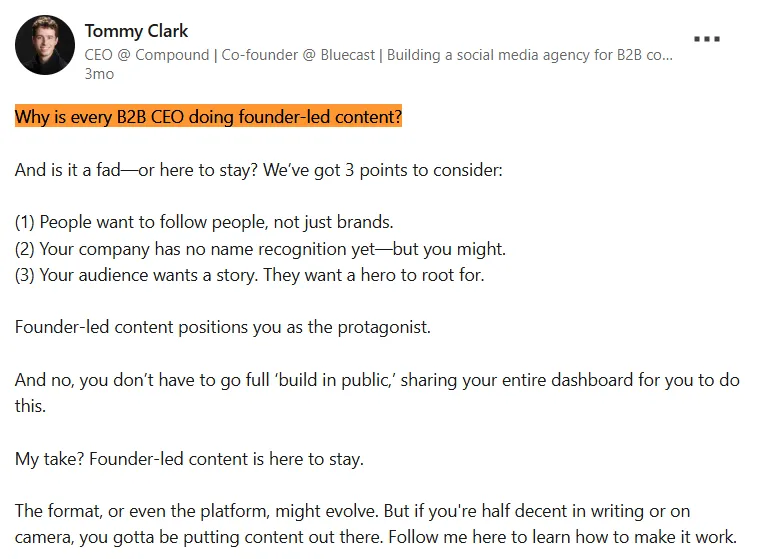
Actionable Tips from Experts :
- Write down 3–5 core values for your brand—and post with purpose: When every piece of content reflects your values, it builds consistency and trust. This helps your audience connect with your brand on a deeper level and positions you as an authentic, reliable voice in your niche.
- Block 15 minutes a day to engage—yes, every day: Responding to comments or starting conversations shows you’re present and approachable. This daily habit builds community, boosts visibility with the algorithm, and reinforces your credibility with both followers and future customers.
- Track where your audience is most active—and double down there: Your audience might be scrolling on LinkedIn, lurking on Twitter, or chatting in DMs. You need to find that sweet spot and focus your efforts there. It’s how you stop wasting time and money and start showing up where it actually matters.
7. Employee-Generated Content Builds Brand Trust
EGC isn’t like traditional advertising or influencer partnerships; it offers a genuine glimpse into the company’s culture, values, and day-to-day operations.
In a world where authenticity is supreme, Employee-Generated Content (EGC) has emerged as a powerful brand trend. By showcasing real people behind the logo, businesses can build deeper trust, foster credibility, and drive engagement.
A participant asked during our social media trend webinar if they wanted to know more about EGC as one of the newest trend predictions for 2025. Our panelist highlighted how EGC enhances trust and humanizes brands.
“The power of individual employees sharing content supported by company pages is immense. It’s not just about promotion; it’s about showcasing real people behind the brand,”
– Luan Wise
EGC has become a more effective tool than paid celebrity endorsement because your audience knows big celebs are getting paid to promote products, but employees bring credibility.
Jon offered a thoughtful idea to create guidelines for employees, but let their personalities shine. Show them the benefits of building their brand while supporting the company.
Listen to the full discussion on this trend in the webinar
Why Employee-Generated Content Matters in 2025:
Employee-generated content is gaining momentum because it addresses the growing demand for transparency and authenticity in social media marketing.
- Builds Trust: Customers are more likely to trust employees than faceless brands or paid influencers. Because, let’s face it—people trust people more than brands. When your team shares genuine stories, it builds real credibility.
- Drives Engagement: Your employee posts often outperform official brand content in reach and engagement. This is so because it feels personal, not promotional. It helps your content break past the algorithm and land where it counts—on the feeds of decision-makers.
- Humanizes the Brand: Employee-generated content showcases the people behind the company, giving audiences a reason to connect emotionally. This helps by bridging the gap between your brand and the target audience.
At SocialPilot, we believe EGC is one of the most impactful strategies brands can adopt. Empowering employees to share their stories strengthens internal morale and amplifies your brand’s reach and authenticity.
EGC is not a social media trend; it is a proven strategy. Our social media manager, Diksha Singhal, often creates EGC content and shares it on her LinkedIn account to promote upcoming webinars, masterclasses, or launches.
This strategy has proven to be a win-win, attracting more engaged participants to SocialPilot’s webinars and boosting her audience and follower base.
Actionable Tips to Leverage EGC:
If you’re ready to integrate EGC into your marketing strategy, here’s how to get started:
- Encourage Creativity: Let your team be themselves online. When employees share real, unscripted moments, it builds trust and relatability. For your audience, it shows the human side of your brand. This is exactly what builds emotional connection and drives consideration.
- Promote Behind-the-Scenes Content: Everyday moments such as team lunches, brainstorming sessions, or product sneak peeks make your brand feel real. Sharing this kind of content helps people to get a sense of your culture.
- Use Tools for Seamless Sharing: Make it easy! A tool like SocialPilot lets you curate and approve content so employees can share it without stress. It’s especially helpful for brands with distributed teams who want consistency without losing authenticity.
- Recognize Contributors: Shout out to eam members who go the extra mile. Recognition boosts morale and motivates others to join in. For your followers, this shows your internal culture is strong—an often-overlooked trust signal that drives long-term brand loyalty.
8. A Shift from Influencers to Loyal Customers
In 2025, a new wave in influencer marketing is taking shape: brands are shifting their focus from celebrity influencers to loyal customers and niche communities.
This pivot is driven by the demand for authenticity and trust, which traditional influencer marketing often struggles to deliver. Loyal customers are now stepping into the spotlight, creating content that resonates more with real audiences and fostering deeper brand connections.
Our social media trends webinar panelist, Katie Murphy, highlighted this evolving trend, emphasizing how the voices of loyal customers are reshaping brand advocacy.
“It’s all about trust and authenticity. Customers are becoming influencers because their content resonates more with real audiences. And we will see more of that coming this year.”
– Katie Murphy
This idea was further reinforced when Jon added actively seeking your fans. He believes that even if the fan base of your brand is small, it is loud, and they are talking about your brand on social media, you just need to find them.
He advised us to use social listening tools to find out who’s already talking about our brand positively. Engage with them, offering opportunities like trips, exclusive events, or early product access.
Listen to the full discussion on this trend in the webinar
But how do you find customer advocates? Here’s how:
- Identify advocates who are already talking positively about your brand.
- Engaging them with personalized messages, thanking them for their loyalty, and offering collaboration opportunities.
- Empowering advocacy with exclusive experience, early product access, or branded merchandise to encourage them to share their stories.
Why This Shift Matters in 2025:
Here’s why this trend is gaining traction:
- Higher Engagement Rates: People trust people—not polished promotions. When loyal customers create content, it feels more genuine and relatable. For your target audience, this means better engagement without big ad spends. It’s about building community, not just broadcasting a message.
- Deeper Trust: Peer-to-peer recommendations carry serious weight. Customers are more likely to believe other consumers like them who’ve actually used your product. For your audiences, this creates social proof that drives action, especially in industries where trust fuels conversions.
- Cost-Effectiveness: High-profile influencers can burn through budgets fast. Tapping into happy customers gives you authentic advocacy at a fraction of the cost.
Not only are niche brands leveraging this approach, but big brands like Adobe are also finding success by focusing on their most loyal customers.
The content below shared by a loyal Adobe customer proves how, from being their brand advocate, she got to enjoy an exclusive event that further empowered the advocacy.
View this post on Instagram
Actionable Tips to Activate Loyal Customers:
If you’re ready to embrace this trend, here are some practical steps to get started:
- Use Analytics and Social Listening: Keep an eye on who’s already talking about you online. Tools like SocialPilot or Brandwatch help spot potential advocates in real time. For your audience, this ensures outreach is targeted and based on genuine sentiment—not assumptions.
- Create Exclusive Opportunities: Give your loyal fans a reason to stay excited—early product access, event invites, or sneak peeks work wonders. This builds a sense of community and rewards advocacy without needing big budgets or polished influencer campaigns.
- Encourage Content Creation: Make it easy (and fun!) for customers to share their experience. Offer prompts, hashtags, or templates to make it easier for them. This empowers them to become storytellers, boosting reach and engagement while keeping the brand voice rooted in real-world credibility.
- Celebrate Your Advocates: Shine the spotlight on your superfans! A simple shoutout or thank-you post can go a long way. This not only strengthens relationships but also shows others that your brand genuinely values its community.
9. Video Content Continues to Dominate
As we move forward in 2025, video content remains a non-negotiable aspect of social media strategies.
With short-form videos like TikTok, Instagram Reels, and YouTube Shorts leading the pack, the emphasis on engaging, concise, and visually appealing video content is stronger than ever.
Platforms continue to innovate video features to keep users hooked and brands visible.
Why Video Content Matters:
SocialPilot Instagram Trends Report 2025 shows that Instagram Reels have a 49% larger audience than carousels and images, with the highest share percentage of 0.08%.
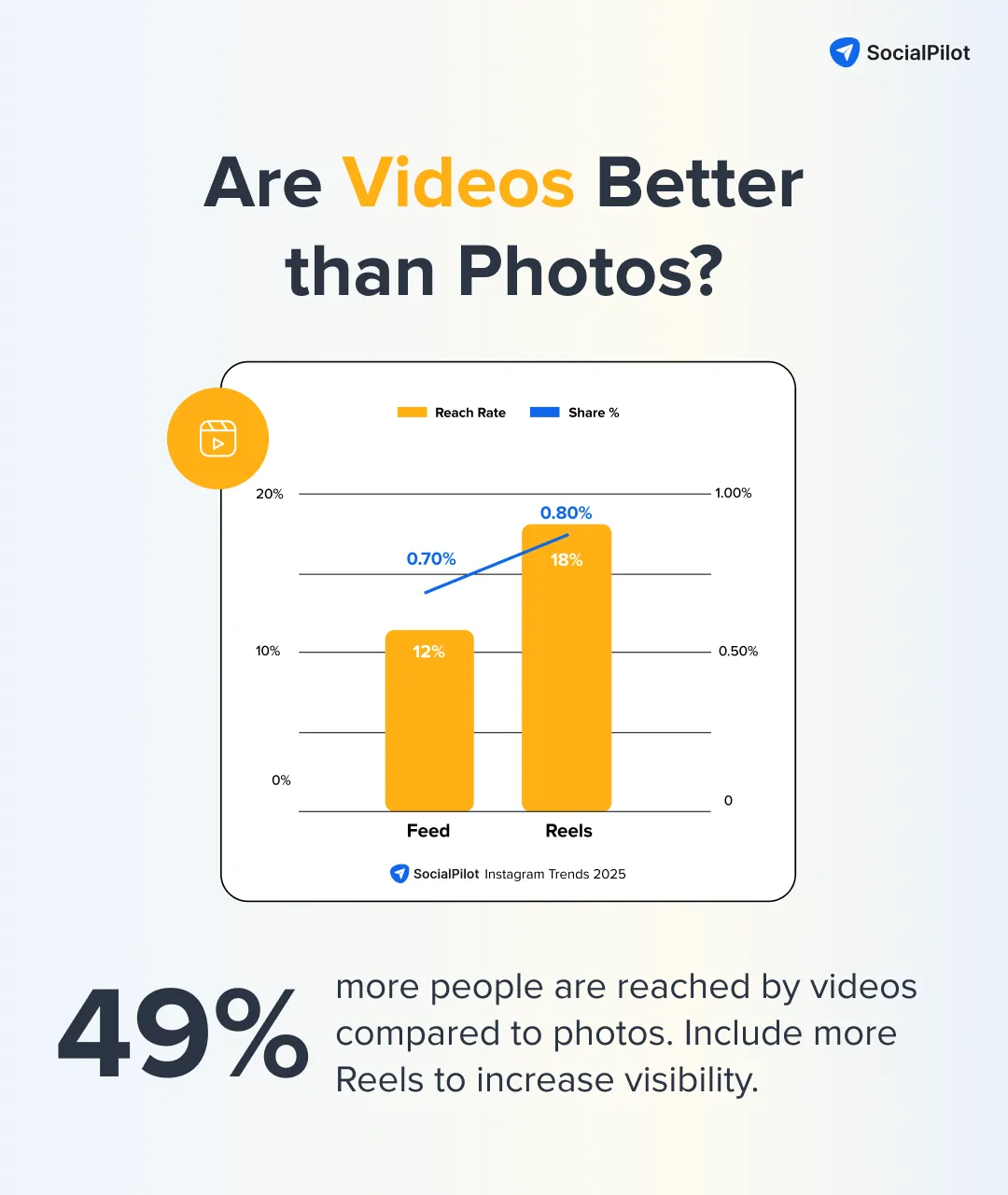
This proves that Reels have become the gold standard for grabbing attention, and users now expect entertaining, informative visual content as a default.
Actionable Tip for Video Content:
To harness the power of video content in 2025, brands should focus on the following strategies:
- Focus on Quality and Authenticity: Polished videos are great, but what really wins hearts in 2025 is realness. Show your brand’s personality without overtly trying to hide your flaws and all. This builds trust and gives your audience a reason to believe in your message (and not scroll past it).
- Tell Stories: Stories spark emotion, and emotions drive action. Even a 15-second clip can tell a mini-story. So use this opportunity to build a narrative around your product, your people, or your mission. It helps viewers connect on a deeper level.
- Keep It Short and Sweet: Attention spans are shorter than ever. Try to aim for videos under 60 seconds to keep things snappy. This will help in ensuring that your core message lands before the swipe happens. This is also critical for social growth and engagement.
- Use Subtitles: Most people scroll with sound off. Subtitles make your content accessible, understandable, and inclusive. Plus, it’s a small tweak that increases watch time, which the algorithm loves—helping you rank higher in feeds.
- Repurpose Content: One great video = multiple assets. This means that you can turn long videos into clips, quotes, GIFs, or blog teasers. This not only saves time but also keeps your content engine running across platforms, reinforcing your message without repeating it.
In a not-so-surprising way, social media is becoming a search engine, surpassing traditional search engines like Google, Bing, etc. Users increasingly turn to social media platforms for search purposes, seeking information, reviews, and recommendations.
Even though we predicted this trend in 2024, and it did come true, in the coming year, social media will also be a place to authenticate a brand or a business because even if they don’t have a website, they will likely have a social media account.
In response, social media platforms also incorporate keyword and SEO techniques to help social media users discover results better.
People search directly on platforms like Instagram or TikTok, whether looking for product recommendations, reviews, or even how-to guides.
For many users, social media feels more personal and immediate than traditional search engines.
This trend reflects a broader shift in consumer expectations. Social media platforms are seen as more dynamic, engaging, and authentic than traditional search engines, which often lack the immediacy and relatability users crave.
Why It’s Important:
The data below shows that in 2023, the percentage of users who visited social networks was higher (94.6%) than those who visited search engines (81.8%). This proves people use platforms like Instagram, Twitter, etc., more than Google.
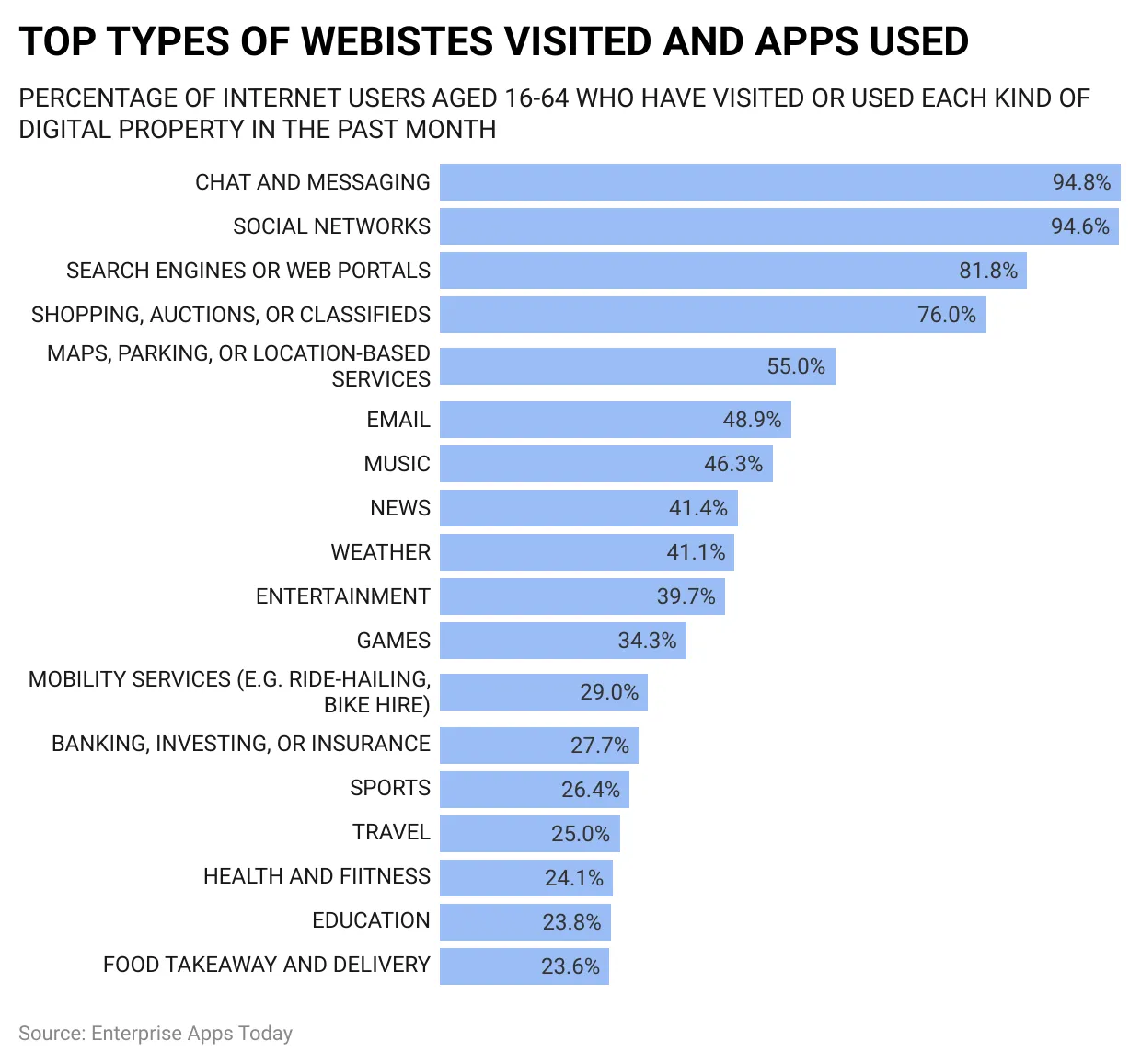
- Focus Where Your Audience Is Already Searching: When more than 90% of your users are browsing social platforms other than Google, you can’t afford to ignore it. Being discoverable on social media helps you meet customers right where they’re searching, making your brand more accessible and relevant in real time.
- Social Profiles Are Your New Homepage: For many, your Instagram or TikTok profile is now the first stop—not your website. A well-optimized, active social page boosts credibility, builds trust, and ensures you’re not overlooked in a scroll-happy, search-driven world.
Actionable Tip:
- Incorporate relevant keywords and hashtags: Using searchable keywords and hashtags in your captions and bios helps your content appear in platform searches. It boosts visibility and puts your posts in front of people actively looking for what you offer—without relying on ads.
- Optimize your profile and posts for search: Think of your social profile like your storefront. A clear bio, category tags, and keyword-rich captions help algorithms and users understand who you are. It increases your chances of showing up when someone searches for your niche or service.
Tip: Avoid overloading your content with keywords, as this can appear inauthentic and may be penalized by platform algorithms.
11. Short-form Story Telling
Short-form content is still king, but it is evolving. People don’t just want trends and quick tips anymore; they want stories. In 2025, to make your content successful, focus on making it more humanized with stories that connect.
Your audience is looking for more meaningful narratives that resonate emotionally, even within brief content formats like Reels, Shorts, or TikToks. Start merging your short-form video content with social media storytelling techniques.
Why It’s Important:
Storytelling is the best way to show your audience the real you. It is a powerful medium to nurture relationships and continue winning them daily.
Storytelling in short-form content can lead to higher engagement, shareability, a loyal audience base, and more reach.
- Builds Real Connection: Short-form storytelling lets you go beyond surface-level content and share human moments. It is very helpful when your audience feels something which builds trust, emotional connection, and long-term loyalty, especially important in crowded feeds where attention is scarce.
- Boosts Engagement and Shareability: People remember stories more than facts. When your Reels or TikToks tell a quick, relatable story, viewers are more likely to watch till the end, share it, or even follow you. This amplifies your reach without needing a massive budget.
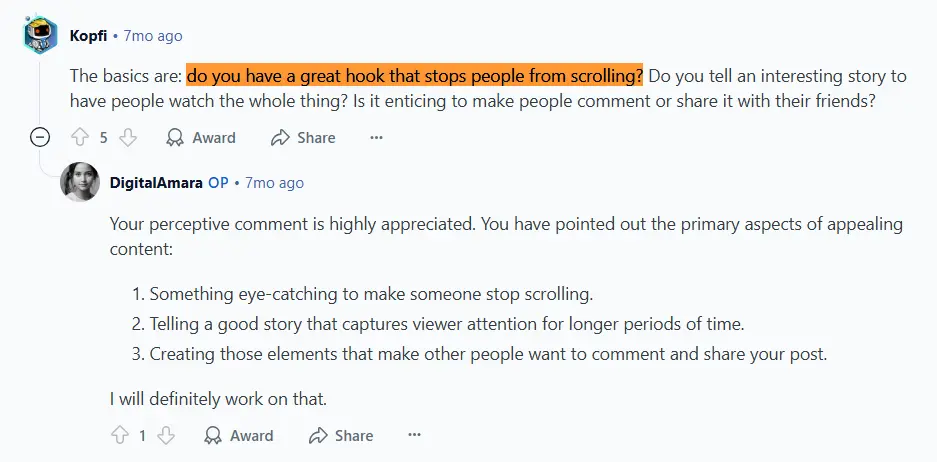
Actionable Tip:
- Structure your short-form content with a clear beginning, middle, and end: A mini-story arc keeps viewers hooked and helps them follow the message easily. This structure boosts retention and completion rates, which signals quality to the algorithm—helping your video reach more people.
- Create serialized content that connects with your audience through short-form content: Think “episode-style” posts. A series keeps people coming back and builds stronger audience loyalty over time. It also makes your content easier to plan and more strategic for long-term engagement.
- Focus less on flashy effects and more on relatable storytelling: Trendy filters fade fast, but stories that reflect real experiences stick. Viewers are more likely to engage when they see themselves in your content—it boosts authenticity, which is key to trust and repeat views.
- Share more raw, behind-the-scenes, unfiltered content: Showing your human side through your daily routines, slip-ups, or office moments, adds relatability and emotion. It makes your brand feel approachable, and emotional storytelling often drives comments, shares, and saves.
12. Zero-Click Content
Zero-click content is going to make the headlines in 2025. Zero-click content is precisely what it sounds like: content that provides value within the platform, eliminating the need for social media users to click external links.
Sometimes, it’s also called minimal-click content, which requires a minimal click to get the value out of the content. This approach caters to social media users’ need for immediate information.
Why It’s Important:
More and more social media platforms prioritize content that retains users, like Twitter Threads, TikTok videos, Instagram Reels, etc; none of these content types require any click to get the value or need the viewer to click a link and get redirected to another platform.
Even Google agrees with this concept. In 2020, more than 64.82% of Google searches ended without a click. In response, Google came up with AI search results that require no clicks.
- Platforms now favor content that keeps users within the app: Social media platforms reward content that doesn’t redirect people away. Zero-click formats like Reels and Threads improve visibility and reach by aligning with platform goals—keeping users engaged without needing them to click out.
- It reflects how people now consume information: With attention spans shrinking, people want instant value. Zero-click content gives them answers right where they are. It builds trust, shows authority fast, and increases chances of saves, shares, and follows—all without needing an external link.
Actionable Tip:
- Use automation tools to send links via DMs when people comment: This keeps your post clean while still offering more value. It will help you to boost engagement, automate follow-ups, and let you deliver additional information without forcing users to leave the platform. This makes for a perfect zero-click strategy that drives interaction.
- Create comprehensive posts using infographics, carousels, or long captions: Giving everything upfront builds trust and positions you as the go-to source. These formats let you educate, entertain, or persuade in-platform—helping you stand out in feeds and encouraging saves and shares without extra clicks.
To increase accessibility and keep your content zero-click friendly, our social media trends panelist, Jon, stresses keeping the content accessible with captions and subtitles.
He suggests,
“Keep captions because your video is incomplete unless you have them. After all, it ensures accessibility, and a lot of people watch with sound-off.”
– Jon Stephen Stansel
Listen to the full discussion on this trend in the webinar
More and more people are drawn to social commerce because of the convenience of purchasing from the place where you were influenced to buy it. Making social media more important than the website.
Yes, we predicted the rise in Social commerce for 2024, and in 2025, you will come across more interactive social commerce abilities like live stream shopping and AI shopping recommendations. You heard it right; this is how high social commerce will rise.
Why It’s Important:
TikTok shop has nailed it by allowing brands to sell directly through live streams. This trend combines the user’s excitement and turns it into the convenience of e-commerce. This way, brands and influencers can showcase products, offer exclusive deals, and engage directly with their audience in real time.
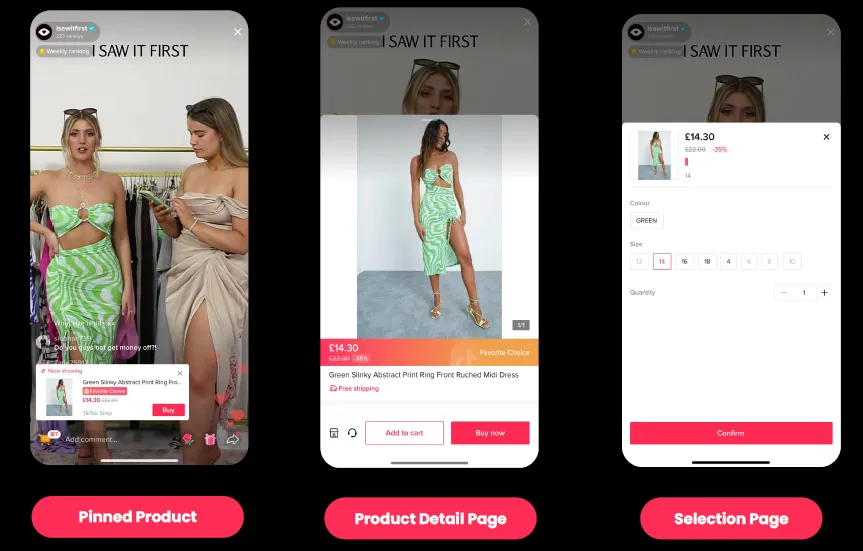
44% of Instagram users are shopping on the app every week. Instagram has had various shopping features for several years, and now it is testing AI recommendations for shoppable posts. Along with this, other platforms like Pinterest, YouTube, and Snapchat are going to continue to develop more e-commerce features.
- TikTok Shop lets brands sell directly via live streams: This matters because it merges entertainment with instant buying decisions. TikTok Live shopping boosts urgency and trust—viewers see products in action, ask questions, and buy in real time, making it perfect for driving conversions and deeper customer interaction.
- AI is powering recommendations: 44% of Instagram users shop weekly, and AI is powering recommendations. This shift means your audience is ready to purchase right where they scroll. With AI curating shoppable content, brands can personalize shopping journeys at scale—turning passive browsing into active, data-driven purchasing right within the platform.
Actionable Tip:
- Start experimenting with interactive shopping tools or testing live selling formats to see what works for your audience: In our opinion, this will help you learn what truly engages your followers. Whether it’s live demos or polls during streams, interactive elements increase session time, spark conversations, and drive real-time sales. This will make your content both engaging and revenue-generating.
- Set up in-app shopping features on Instagram, YouTube, TikTok, and Facebook: Making products shoppable within the platform reduces friction and taps into impulse buying. When users don’t need to leave the app to purchase, conversions become smoother, and platforms reward that kind of seamless experience with better reach.
- Keep your product description and details high-quality with SEO optimization: Clear, keyword-rich descriptions boost discoverability within social platforms’ search tools. Good copy also builds trust, improves accessibility, and helps the algorithm serve your posts to high-intent shoppers—turning attention into action more easily.
14. Text-Based Content Resurgence
Despite the dominance of visual long-form and short-form content, people have renewed interest in text-based content. Some examples are LinkedIn Pulse articles, Twitter (X), Threads by Meta, etc.
As Instagram and Facebook prepare for discoverability, posts with long captions, SEO optimization, and keywords are getting more reach by appearing in more search results.
Why It’s Important:
Text-based posts and content allow for deeper engagement and showcase expertise. Here are two main reasons that justify their importance:
- Text-based posts and content allow for deeper engagement and showcase expertise: Long-form written content gives you space to share insights, tell stories, or break down ideas. It builds authority and trust—especially on platforms like LinkedIn or Threads, where users are looking to learn, not just scroll.
- Platforms like LinkedIn and Twitter are seeing increased interaction with well-crafted written content: Well-written posts spark meaningful conversations and longer comment threads. Algorithms pick up on this engagement, helping your post reach more users—so focusing on text isn’t just smart storytelling, it’s a visibility booster too.
Actionable Tip:
- Share insightful articles, posts, or Threads that provide value to your audience: This positions your brand as a helpful expert. When your content solves problems or sparks curiosity, your audience will come back for more—and algorithms will reward that consistent engagement with more reach.
- Focus on topics that align with your brand and resonate with your followers: Staying relevant keeps your content trusted and relatable. It helps build authority over time, especially when you’re consistent in tone and topics your audience actually cares about—making your content easier to find and remember.
- Share long captioned posts sharing the story behind the image or the inspiration for the Reel: People connect with the why behind what you post. Story-driven captions turn a simple visual into a mini blog, building emotional engagement and increasing the time users spend with your content—both of which boost visibility.
1. TikTok Won’t Be Banned, But Its User Base Will Decline
Even though TikTok has immense regulatory pressure, the platform is expected to navigate these challenges and remain operational in the U.S. However, the increased scrutiny over data privacy and rising competition from Instagram Reels and YouTube Shorts are impacting its popularity.
During the SocialPilot Social Media Trends 2025 Webinar, panelist Jon Stephen Stansel shared his perspective on TikTok’s uncertain future. While confident that the platform would survive, he highlighted how it might no longer be the TikTok we know today.
He strongly emphasized the importance of platform diversification, urging brands not to rely solely on TikTok for their short-form video strategies.
Katie pointed out the need for brands to follow their audience rather than simply jump ship to the next popular platform.
“Diversify your platforms because your audience might not be on TikTok soon. So you have to go where your audience is.”
– Katie Murphy
She recommends that brands focus on diversifying their platforms. Build a robust community on Instagram or YouTube Shorts as a plan B.
Listen to the full discussion on this prediction in the webinar
Several reports highlight a significant slowdown in TikTok’s user growth, particularly among younger demographics.
The graph below clearly shows the decline of TikTok’s user base in the past few years.
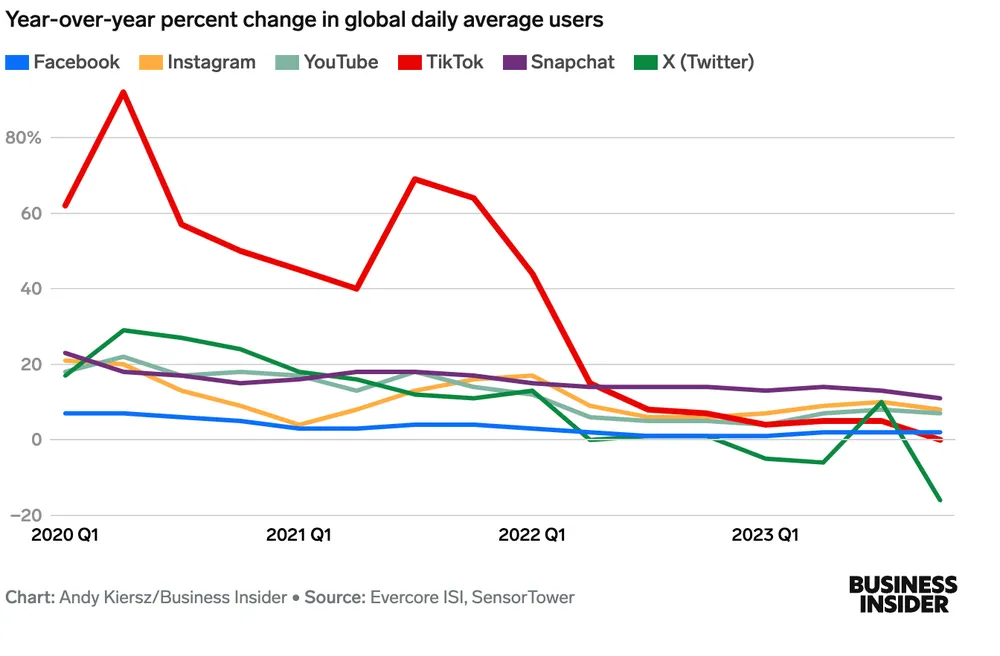
Implication for Brands: We will advise brands and creators to diversify their short-form video content strategy across platforms to reach the audience where they’re most engaged.
2. Threads Will Continue to Grow and Introduce Ads
Threads by Meta leverage Instagram’s audience and simplicity to attract users seeking text-based content. With Meta’s established track record of monetizing platforms through advertisements, Threads will likely follow suit once its user base matures.
A report by Techcrunch says that Threads will begin monetization by running ads only after the retention of the user base.
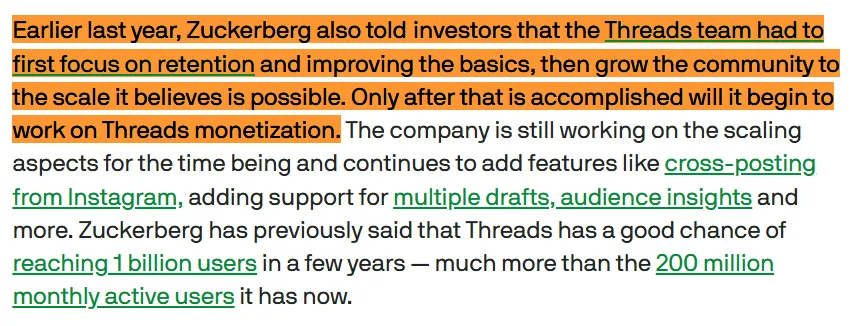
Implication for Brands: Build an early presence on Threads to establish authority and audience loyalty before the platform becomes saturated with ads.
3. “Top Tip” Style Content Will Decline
With the oversaturation of quick tips and repetitive trends, audiences are shifting their preference toward in-depth, meaningful insights. Platforms are also evolving algorithms to favor content that keeps users engaged longer, encouraging creators to move beyond surface-level posts.
As several trends disclosed above prove how storytelling will shine in 2025, “Top Tips” style content that does not connect with the viewers will lose appeal.
Implication for Brands: Focus on storytelling, detailed guides, and case studies to deliver substantial value and build lasting audience relationships.
4. LinkedIn Will Eclipse X
LinkedIn’s targeted focus on professionals, thought leadership, and networking continues to drive growth. In contrast, X will face user trust issues, leadership changes, and reduced appeal among professional audiences. LinkedIn’s consistent improvements to its platform have further solidified its status as a professional powerhouse.
Implication for Brands: Invest in LinkedIn by sharing thought leadership content, building professional connections, and participating in industry discussions.
Ready to Future-Proof Your Strategy?
2025 is going to be a very exciting year for social media. The trends and predictions outlined above are not just abstract ideas but actionable insights that can help you stay ahead in a rapidly evolving industry.
The insights shared by industry experts during our social media trends webinar underline one crucial point: success in social media requires adaptability, authenticity, and strategic thinking.
Whether experimenting with founder-led content, optimizing multi-format strategies, or diving into niche communities, staying agile and aligned with your audience can make all the difference.
The key takeaway? Stay flexible, experiment boldly, and never stop learning. With the trends and strategies here, 2025 will be your most impactful year yet. Let’s make it happen!
